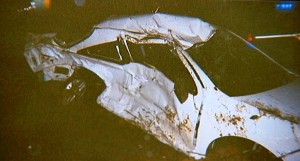General Motors’ legal morass continues to deepen, following an adverse ruling by a court in Georgia that allows the reopening of a case it thought it had settled out of the public’s eye more than a year ago.
Cobb County State Court Judge Kathryn Tanksley has denied GM’s motion to dismiss the new lawsuit filed in May by the family of Brooke Melton, a 29-year-old nurse killed in March 2010 when the ignition switch on her 2005 Chevrolet Cobalt slipped into accessory mode and the car collided with another vehicle, according to the suit. Melton died in Cobb County, part of the Atlanta metropolitan area.
Melton’s parents originally sued the company in 2011 and settled in September 2013 for a reported $5 million. The couple decided to try to reopen the case when internal GM documents began to emerge showing it had long known about the ignition switch problem but delayed a formal recall until February of this year. Parents Ken and Beth Melton are now claiming fraud, negligence and concealment in their new lawsuit.
GM has been hit with a flurry of lawsuits linked to the ignition problem. The maker has meanwhile tried to block any of those legal claims filed prior to its emerging from Chapter 11 protection in 2009, insisting anything that occurred before then is subject to a shield that was part of its bankruptcy deal. But the Melton case occurred after that.
(Hyundai fined $17.5 million for delaying recall, Click Here.)
The maker argued before Judge Tanksley that the new Melton family lawsuit was itself blocked by terms of the 2013 settlement. “GM will review the court’s order once it is entered and will evaluate its options,” spokesman Pat Morrissey said in an email to Reuters news agency.
The Judge allowed the new suit to go forward, at least for now, because of questions about the conduct of GM’s employees and, potentially, the company’s attorney. A senior GM engineer, Phil DiGiorgio, is accused of giving false testimony during a deposition in the original Melton case.
Information that emerged during the original lawsuit – including revelations about a design change quietly made to the switch – helped trigger the recall of 2.6 million GM vehicles, including the Cobalt, and prompted congressional, federal and other investigations into whether the company had withheld knowledge of the problem.
After the recall, the Meltons said they asked GM to withdraw the settlement, but the company refused, according to court filings. The new lawsuit filed in May charged GM had fraudulently concealed critical evidence about the switch.
GMs own internal investigation indicated some of the testimony in the original Melton deposition was false.
(VW recalling 151,000 Tiguans due to stalling problem. Click Here for details.)
Meanwhile, GM is facing multiple claims resulting from damages from the faulty switch and not all of the claims will be resolved through the special victims’ compensation fund the maker has set up, and which is being run by Kenneth Feinberg, a noted compensation specialist who has administered settlements in other complex cases.
GM has set aside at least $400 million for the program, according to its chief financial officer, though CEO Mary Barra has said the fund is open-ended and that the maker will pay any and all claims Feinberg feels are justified. The program began formally accepting claims this month. While GM has so far held to its position that 13 were killed in ignition switch-related crashes, most observers believe the number actually is quite higher.
One of the most serious problems GM faces is a criminal investigation by the U.S. Justice Department. At the same, attorneys-general from 45 different states are considering whether to bring their own actions against GM, as is the district attorney in Orange County, California.
(Click Here for more on the latest GM recalls.)
GM has tried to get beyond the ignition-switch recall scandal by moving to fix not only the 2.6 million vehicles equipped with the defective ignition switch but also repair potential defects on millions of other vehicles including some built as far back as the late 1990s. It staged four new recalls last week – initially announcing five, then revising the total. Nearly 26 million vehicles sold in the U.S. have been affected.
(Paul A. Eisenstein contributed to this report.)


The problem with trying to reopen this setlled case is that the Melton family will look greedy and just want to get a bigger payday. Another thing to consider is they may be placed in the general “pool” of the special victims program, so that $5MM settlement may go bye-bye and dwindle to a few hundred grand if they’re lucky. If their layer(s) aren’t sharp they will lose far more than they may be looking to gain.